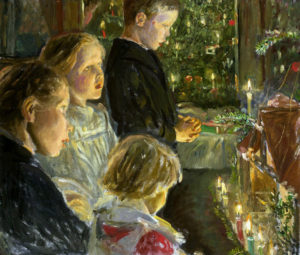THIRD DAY of CHRISTMAS:
Holy Innocents’ Day, Childremas
Never underestimate the threat of an insecure, self-centered person in a position of power. Today we remember the poor children slaughtered by order of King Herod, the leader of Judea who felt threatened upon hearing the news of the Christ child’s birth. It is traditionally thought of as the most unlucky day of the year. The day was viewed with such great superstition in ages past that it was considered unlucky even to wear new clothes on the Third Day of Christmas, or to clip your fingernails, or to undertake any new project. Best to leave it for the following day, when good luck would return.
I personally don’t respond well to so much negativity, and I don’t agree with allowing an immature, unstable leader in history rob us of our peace and joy today. Doing so gives Herod too much power. I think a more positive approach in remembrance of all those lost that Third Day of Christmas is to honor the children in our lives and the children we once were: to reconnect with a time when we were more willing to suspend disbelief, more willing to be fully immersed in things, as children are wont to be. We leave childhood behind because we have to. But the child you were has certainly informed the adult you’ve become, so there is a thread that resonates across the years. This is something worth nurturing. The happiest, most engaged people I know still retain a measure of the wonder they knew as children.
One of the oldest midwinter traditions in the Church is the election of a Boy Bishop each St. Nicholas’s Day on the Sixth of December. He would be chosen from the choirboys, and he would rule until Childremas, this Third Day of Christmas. The office was serious business. The Boy Bishop wore full vestments and mitre, and he would perform all the duties of a bishop, save for celebrating mass, although he did often deliver the sermons. The actual bishop would, in some places, have to follow the orders of the Boy Bishop. These traditions tap into the ideas of the Feast of Fools, as well, where the normal order of things is ceremoniously reversed (which blends into the customs for the Fourth Day of Christmas, tomorrow), and perhaps relates to the words of the Magnificat: God has put down the mighty from their throne and has exalted the humble and the meek.
In medieval times, the Boy Bishop could be found in most every cathedral in France, Britain and Germany during the Yuletide season. The custom was treated with such seriousness that if he should die while in office, the Boy Bishop received the same burial honors as a real bishop. The 1869 Chambers Brothers’ Book of Days gives mention to one unfortunate Boy Bishop who did come to his end while in office, telling us that a monument to his memory may be found on the north side of the nave at Salisbury Cathedral.
In Spain and Latin America, the Third Day of Christmas is a day for practical jokes, the victims of which being called inocentes, although sometimes it is the prankster that gets that name in a plea for forgiveness. No matter how you spend the day, the theme, it seems, is universal: celebrating and honoring children. If it’s the child inside, how do we go about doing that? Keep it simple, I’d say. Are there favorite things you used to do when you were a kid that you just don’t do anymore? What was your favorite book back then, or your favorite movie, or your favorite thing to eat? Today, Childremas, is a good day to go back and give those things another try. Make it a playdate with the child you were. Get yourselves reacquainted.
Image: “Children by the Christmas Tree” by Leopold Graf von Kalckreuth. Oil on canvas, c. early 20th century. [Public domain] via Wikimedia Commons.
